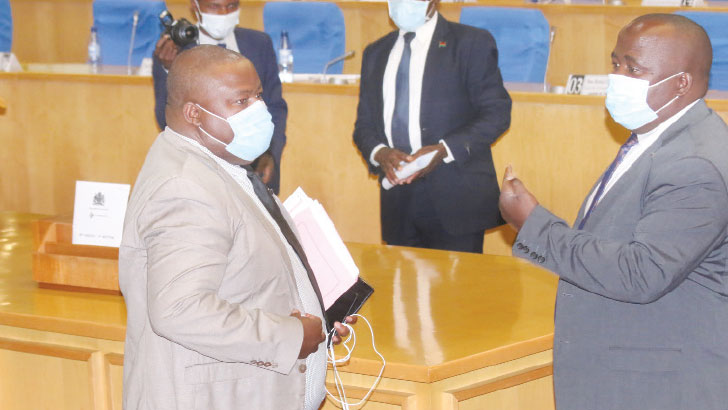DPP says budget unrealistic
Opposition Democratic Progressive Party (DPP) yesterday said the K1.9 trillion 2021-2022 National Budget, which Finance Minister Felix Mlusu presented in Parliament yesterday, is premised on unrealistic revenue expectations that could be swept away by the Covid-19 pandemic.
The party’s spokesperson on finance Joseph Mwanamvekha said he foresees revenue being subdued and expenditure increasing.
He said: “Many things will not be achieved; they are projecting that inflation will be at 9.4 percent. We are coming closer to the lean period, starting from September to December, normally prices, particularly of food, which is a major determinant, picks up.
“In the budget, most of the poor people will not benefit. Things are upside down. We are subsidising beer, not issues that the poor Malawians will require, for example, cooking oil, which has gone up because of VAT, inflation and depreciation of the kwacha. The farmer, too, is not going to benefit.”

the House Chimwendo Banda after the budget presentation
Mwanamvekha further argued that the absence of an International Monetary Fund (IMF) programme after the Tonse Alliance administration cancelled the Extended Credit Facility (ECF), will bring a financial squeeze on government resources as other donors will not inject any resources into the budget in the absence of ECF.
He said it was unlikely Treasury will meet most of its targets and cautioned against applauding the administration for starting to implement its key campaign pledges such as the inclusion of the duty-free week and free electricity issues in the budget.
“I would like to see how they are going to implement the water and electricity free connection promise. They have put up a policy, they have not told us when it was coming to effect, so, I don’t think it’s time to celebrate yet, because we don’t know when it’s going to be implemented,” Mwanamvekha said.
The DPP legislator further said the his party will wait for the policy to be adopted and approved.
“Secondly, on the duty-free week, they have restricted it to $3 000. How much is that? They are saying this is about small and medium enterprises [SMEs] or small traders; it’s very selective, it’s not going to help companies that produce or create jobs for Malawians,” he said.
Mwanamvekha further raised concerns over the growing national debt, from K500 billion to K800 billion, saying the development will mean more borrowing for the government, which crowds out the private sector of revenue.
Quizzed on whether there were any positives in the budget, Mwanamvekha said the attempt to ensure stabilisation of the currency and re-alignment expenditure to the national development blueprint were positive developments.
“But the test of the pudding, they say, is in the eating, so, I would like to see if that can be achieved. The other thing is the IMF programmes, the minister says they are still discussing.
“The other year we wanted to increase Farm Inputs Subsidy Programme [Fisp], but the donors rejected it. The donors don’t want subsidy and now the maintenance of the AIP is good for Malawians, but I doubt that the donors will accept it. In other words, it is good to have an IMF programme and some of the programmes they have put in place,” he said.
He said he will officially respond to the budget statement in two weeks’ time, after the cluster meetings.
Centre for Social Accountability and Transparency executive director Willy Kambwandira while welcoming the budget as “promising”, called for prudence in implementation.
“Overall, the budget statement appears to be a good fiscal blueprint if implemented. The economic growth projections to 5.2 percent is also encouraging.
“However, we believe that the impact of this economic growth can only be realised when there is strict financial prudence, control and oversight on the limited public resources,” he said
But Kambwandira welcomed the announcement that government is set to present the amended Public Finance Management Bill in the current sitting.
On his part, Malawi Local Government Association executive director Hadrod Mkandawire said local governments lost out on the budget in terms of the minimum financial requirements for them to effectively delivery development outcomes and meet the wide expectations of the citizens.
He said: “Much as we appreciate the improved allocation for city roads construction, the overall development budget for local councils remains low. It is also regrettable that our plea for a bailout package has also been overlooked.”
Mkandawire said the bailout package could have gone a long way in transforming the local governments on how they serve the citizens and contribute to the Malawi 2063 Vision, MGDS III and Sustainable Development Goals.





